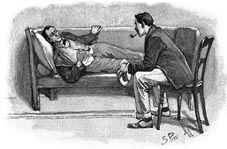

| April 1891 | |||
| 24th | Fri | -Holmes walk into Watson's consulting room upon the evening. | |
| 25th | Sat | -Watson reached the Lowther Arcade at 9.15am then to Victoria Station to be in time for Continental Express. -Change trains at Canterbury. |
|
| 26th | Sun | 1st day in the Continent | -In Brussels |
| 27th | Mon | 2nd day in the Continent | -In Brussels -Holmes telegraphed to the London Police. -In the evening found a reply at the hotel. |
| 28th | Tue | 3rd day in the Continent | -In Strasbourg arguing the questions for half an hour.
-The same night on their way to Geneve. |